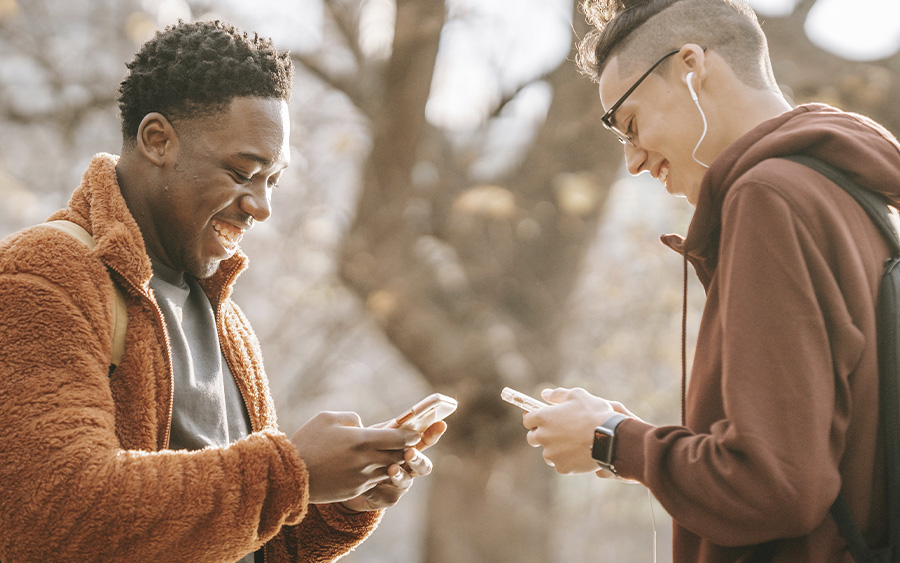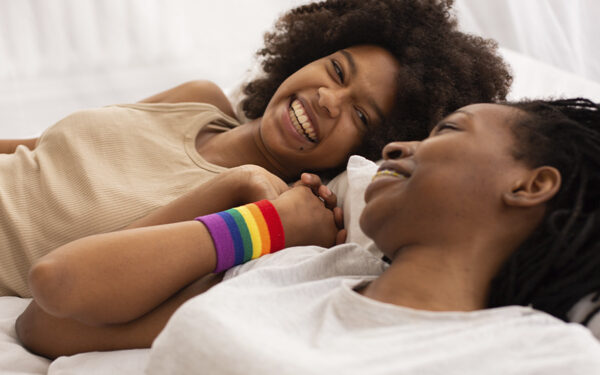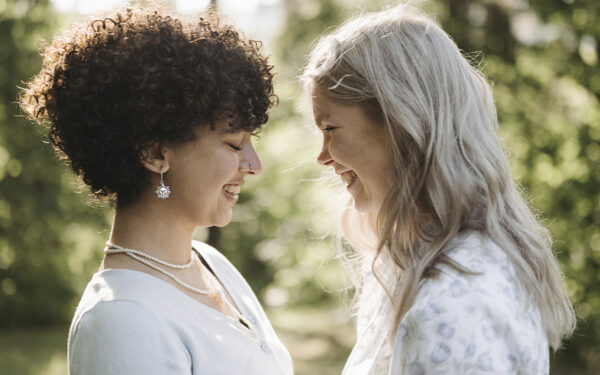Many LGBTQ+ folks (lovingly referred to as queer from here on) expressed to me throughout the pandemic that certain dating apps, you probably know which ones I mean, have become a ubiquitous part of life. During surges in the pandemic, socializing and dating through apps became ostensibly safer than physically entering other traditionally queer spaces. For many queer folks, it was and is a desperately needed lifeline. Despite their popularity and at times crucial role in connecting folks there are several important considerations to keep in mind as you use them. Don’t worry. I promise I’m not here to be a doomsayer or to take your phone from you.
Even before the pandemic, I was often asked: “Are LGBTQ+ dating apps healthy?” “Are hookup apps unhealthy?” On the surface these are straightforward questions but, in typical therapist fashion, I’d like to propose a nuanced answer: I don’t think there’s anything inherently unhealthy about LGBTQ+ dating or hookup apps if one engages in good app hygiene. While not an exhaustive list, here are some good habits to consider:
5 Tips for LGBTQ+ Folks Using Dating and Hookup Apps
1. To Thine Own Self (and Partners), Be True and Don’t Be Afraid to Ask
The first major pitfall I see folks engage in with app use is failing to consider their needs. What are you looking for when you create an account for Tinder, Grindr, Scissr, etc.? Often folks have internalized society’s messaging around what is “good” and “acceptable” around sex and relationships, and this can lead to seeking out experiences and interactions that don’t really align with your needs or desires. Cultural expectations and taboos around hookups and relationships can lead people to state they’re looking for one thing when they’re actually looking for something else. I’ve worked with many clients who are deeply distressed because sexual encounters fail to manifest into relationships. Conversely, I’ve seen clients who are on the other side of this and are dealing with the emotional fallout from people who want more than they are willing to commit to.
A common thread here is that hidden, unclear, or misleading expectations can lead to emotionally difficult situations. It also warrants stating that the app’s advertising or reputation is not necessarily a good indicator of a person’s purpose for using it. Some folks use E-harmony for hookups and folks who use Grindr to find fulfilling long-term relationships. Now, you may be noticing a flaw in my logic here and you are correct: You cannot do anything about the fact that some people will not be transparent or downright misleading about their intentions. You can, however, do something about yours.
So ask yourself before using the app: What am I wanting from it? Am I looking for a relationship? Friends? A one-time or ongoing sexual partner? Are you not certain and just exploring the app? (To be clear, this is a completely valid and healthy place to be.)
Whatever your answer may be, I encourage you to communicate it clearly when interacting with folks. Furthermore, I encourage normalizing asking others what their needs/wants are on the app. It can save a lot of stress and heartbreak for all parties involved. While I personally dislike language like “red flags”, I think it’s best to proceed with caution with anyone who can’t or won’t answer the question.
2. Don’t Personalize Geography
I see this phenomenon frequently with queer college students or young professionals who’ve moved to the area from places where their dating pool was a puddle. Their expectation and hope are that being in a city like Baltimore or D.C. will finally provide a larger LGBTQIA+ community and opportunities for love. To a certain extent, I think this can be a fair expectation. However, I always caution clients to contextualize their location. Not doing so can lead you to personalize phenomena that you have no control over. Consider how much of the queer community in Baltimore or D.C. may be transitory. How many queer folks are here to get a degree or to work a first job and intend to move on? I’ve seen many clients who don’t consider this and interpret their inability to find someone looking for a longer-term connection as a personal failure.
Consider, too, that the increase in potential partners also means that folks may be inundated with messages. While you may be a great match for someone, it can be easy to get lost in the shuffle of messages, taps, etc.
3. Rejection is Protection
Don’t get me wrong. It can also hurt. A lot.
However, as painful as being ghosted or directly rejected can be, it’s honestly for the best. I’ve seen plenty of relationships where someone lacked the will to call things off when they realized they were incompatible. Suffice it to say, this is frequently more painful in the long run. What I would encourage you not to do is attach any larger meaning to ghosting or rejection. It’s a normal part of dating and is not a reflection of your worth. Frequently, it may not have much to do with you – but that’s a blog topic for later.
4. Consider the Underlying Designs of the Apps You Use
This seems like it would be very clear, right? To help you find a meaningful connection. Well, maybe.
Many people don’t realize that an app’s true purpose is not necessarily to help you find a long-term connection. Their purpose is to make money and keep you using the app. That thrill you feel each time you see a notification, or that sense of longing for said notification, is not by accident. It’s by design.
Consider how many apps have paid subscriber levels that allow you to see who has viewed you or who has read your messages. Heck, some of them even have paid levels to improve the quality of your matches. What does this mean for the user? Well, if we accept these paid features operate in good faith, it means these platforms understand how to make your search for love and connection more successful and have chosen not to. At least not without you forking over some serious cash.
5. Log Off From Time to Time
As I mentioned at the beginning. I’m not here to take your phone away. However, my final advice on app hygiene is to remind you to take periodic breaks from them, especially if you find that they’re a source of stress. I promise they will still be there when you’re ready to use them again.
LGBTQ+ Therapy in Baltimore, MD
Have you been experiencing anxiety about using LGBTQ+ dating apps? Or maybe you’ve been struggling with getting back out there or finding a connection?
Relationships are an important part of us and our lives, so it’s normal to experience some anxiety and vulnerability around this matter. Our therapists can help you not only with sexual orientation and gender identity issues but also with any concerns about your relations and desires. They will create with you a safe space to explore, question, and work toward your well-being.






